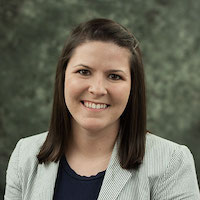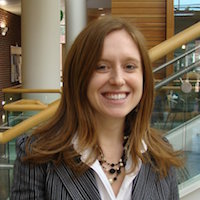UNC researchers receive grant to examine enhanced services in NC community pharmacies
September 8, 2017
Kea Turner, MPH, MA, doctoral candidate in the health policy and management department in the UNC Gillings School of Global Public Health, is co-principal investigator on a grant from the Community Pharmacy Foundation.

Chelsea Renfro

Kea Turner
Together with co-principal investigator Chelsea Renfro, PharmD, an assistant professor in the University of Tennessee Health Science Center, Turner (who earned a Master of Public Health degree from the Gillings School’s Department of Health Behavior in 2012) will implement a proposal titled, “Removing barriers to organizational change in community pharmacies: An analysis of the successes and challenges of implementing enhanced services.”
The $28,000 grant will run for nine months, beginning in October 2017. Its goal is to evaluate how alternative payment models that include community pharmacists as members of health-care teams can successfully be implemented in real world practices.
Alternative payment models, Turner and Renfo explain, offer incentives for health-care organizations to implement innovative population health management strategies that increase the value, effectiveness and efficiency of care. Such programs often emphasize tailored interventions for high-cost patients who are at greater risk than the general population for drug therapy problems and related hospitalization.
Medication management interventions, led by community pharmacists, have demonstrated success in identifying drug therapy problems, improving disease management and medication adherence, and reducing inappropriate medication use among these high-risk patients. Despite the effectiveness of this approach, however, few alternative payment models have included community pharmacists as members of health-care teams.
Community Care of North Carolina (CCNC) — the state’s primary case management program for Medicaid beneficiaries — currently is piloting the Community Pharmacy Enhanced Services Network (CPESN). CPESN is an intervention designed to improve the quality of health-care outcomes, while reducing health-care costs, for high-risk Medicaid patients.
While an evaluation of CPESN already is underway, that evaluation will not assess the program’s implementation. Turner and Renfro see an examination of the implementation process as critical for scaling up the program and supporting similar alternative payment models that demonstrate the value of integrating community pharmacists into health-care teams. The Community Pharmacy Foundation grant will support this focus on implementation science by funding a survey of community pharmacies participating in CPESN and assessing their implementation experiences.
When the survey is complete, Turner and Renfro will analyze the results and identify factors associated with effective implementation (e.g., leadership support, team effectiveness, implementation policies and practices, and workflow). They will translate these findings into practice by developing two web-based learning modules on how to effectively manage organizational change in community pharmacies that are adopting enhanced services, as well as how to integrate enhanced services into pharmacy workflow.
Partners involved in the grant will represent not only the Gillings School, but also UNC’s Eshelman School of Pharmacy, the Center for Medication Optimization through Practice and Policy, the Center for Pharmacy Innovation and Simulation, the North Carolina State University Department of Industrial and Systems Engineering, the University of Tennessee Health Science Center and Community Care of North Carolina.
“We are very grateful for this opportunity from the Community Pharmacy Foundation to bring together experts from multiple disciplines,” Turner said. “By combining knowledge from pharmacy, systems engineering, education and public health, we can determine how best to disseminate our research findings with community pharmacies in North Carolina and nationwide.”
Co-investigators for the grant are Christopher Shea, PhD, assistant professor of health policy and management in the Gillings School, and Stefanie Ferreri, PharmD, clinical professor in the Eshelman School’s Division of Practice Advancement and Clinical Education.
Gillings School of Global Public Health contact: David Pesci, director of communications, (919) 962-2600 or dpesci@unc.edu
